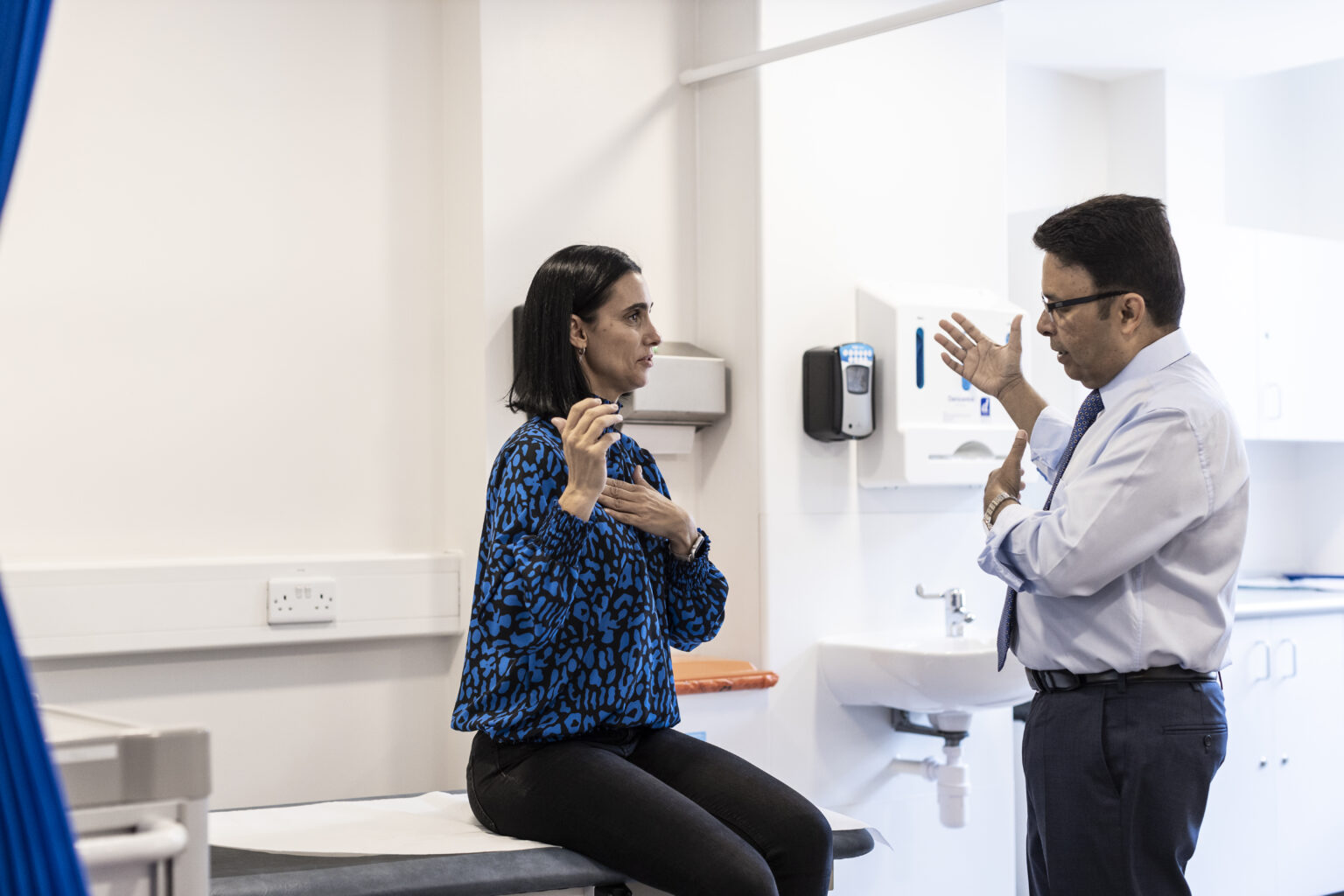Contact number: 020 7806 4060
Everything You Need To Know
A Sentinel Node Biopsy is a surgical procedure designed to determine if cancer has spread beyond the primary tumour into the lymphatic system. It involves injecting a dye near the tumour to trace the path to the sentinel lymph node. The node is then surgically removed and examined for cancer cells. The outcome of this biopsy can significantly influence the course of treatment, offering a more personalized approach to cancer care.
By accurately identifying the first lymph node or nodes (“sentinel node”) that cancer cells are likely to spread to from the primary tumour, SNB enables a targeted approach, significantly reducing the need for extensive lymph node removal and thereby minimizing post-operative complications. Although termed a ‘biopsy’ this technique actually removes a whole lymph node or nodes.
Consultants who perform Sentinel Node Biopsy
Before Surgery
This preparatory phase is designed to ensure you are fully informed and prepared for the procedure. A detailed review of your medical history and current health status will be conducted, including necessary blood tests. It’s essential to discuss all medications and supplements with your doctor, as adjustments may be required to mitigate any potential risks during the biopsy.
Patients are advised to avoid eating or drinking for a specified period before the procedure to prepare for anaesthesia. Additionally, you will receive instructions on pre-operative care, including the use of special antibacterial soap to reduce the risk of infection.
During Surgery
The procedure day marks a pivotal moment in your treatment journey. After the administration of general anaesthesia for your comfort, the surgical team proceeds with the sentinel node mapping.
With precision, the identified sentinel nodes are surgically removed through a small incision. The meticulous nature of this procedure underscores our commitment to conserving as much of the healthy lymphatic system as possible, mitigating the risk of complications such as lymphedema.
After Surgery
The post-operative phase is characterised by a focus on recovery and comfort. Most patients can return home on the same day, beginning their recovery with specific aftercare instructions provided by the surgical team. These guidelines cover managing any discomfort, caring for the incision site, and recognising signs of any potential complications.
A follow-up appointment will be scheduled to discuss the results and outline the next steps in your treatment plan. This meeting is a cornerstone of your care, ensuring you are fully informed and supported as you progress through your treatment journey.
How Much Does a Private Sentinel Node Biopsy Cost?
from £4,000*
The price of a private Sentinel Node Biopsy depends on the type of procedure performed.
*The prices shown are the estimated from price and would include all hospital related costs associated with your treatment, from admission to discharge. The price does not include the cost of consultation, diagnostics, or the surgeon or anaesthetist fee.
| The cost of a private Sentinel Node Biopsy in the Breast is from £5,000* at St John & St Elizabeth Hospital |
| The cost of a Private Sentinel Node Biopsy for Melanoma is from £4,000* at St John & St Elizabeth Hospital |
How to pay for your treatment
If you’re… paying for yourself
Did you know you don’t need private medical insurance to come to St John & St Elizabeth Hospital? As a self-pay patient, you can access safe, outstanding quality health care at times to suit you.
For scans and tests, as well as to see most consultants, you’ll still need to be referred by a medical professional like your GP, but as a self-pay patient, the process is more straightforward. You won’t need authorisation from an insurance provider, and you’ll have greater choice of consultant and appointment times.
If you’re… insured
St John & St Elizabeth Hospital is approved by all major medical insurance companies. If you have a personal private health insurance policy, or your company provide it for you, you can use it to pay for your care from your initial consultation through to treatment, surgery and aftercare such as physiotherapy. Not all private health insurance plans cover the same things. It’s very important to check exactly what you are covered for with your insurance provider.
Initial Consultation
Your pathway begins with a consultation with our specialist, where you’ll discuss your medical history, the sentinel node biopsy, and address any questions. This step ensures you’re fully informed about the procedure and its implications.
Treatment Plan
Following your consultation, we’ll craft a personalised treatment plan, detailing the steps leading to your biopsy, expectations for the procedure, and post-operative care.
Pre-operative Assessment
A comprehensive pre-operative assessment will evaluate your readiness for the procedure, encompassing essential health checks and tests to ensure your safety and optimise outcomes.
Procedure Day
On the day, our team will guide you through the final preparations, support you during the biopsy, and ensure your comfort and care throughout the process.
Aftercare and Follow-up
Post-operatively, you’ll receive aftercare instructions and a follow-up appointment to discuss the results and next steps in your treatment journey, ensuring continuous support and care.
Top Tips for Recovery
Adhering to the aftercare guidelines provided by our team is crucial for a smooth recovery. This includes managing any discomfort, caring for the incision site, and recognising signs of potential complications.
Gentle, recommended exercises can aid your recovery, improving circulation and reducing the risk of complications. Our physiotherapy team will guide you on the appropriate activities.
Nutrition plays a vital role in healing. Focus on a balanced diet rich in vitamins, minerals, and hydration to support your body’s recovery process.
Medically reviewed by Mr Neil Johns - MBBS MD FRCS on 26/04/2024

